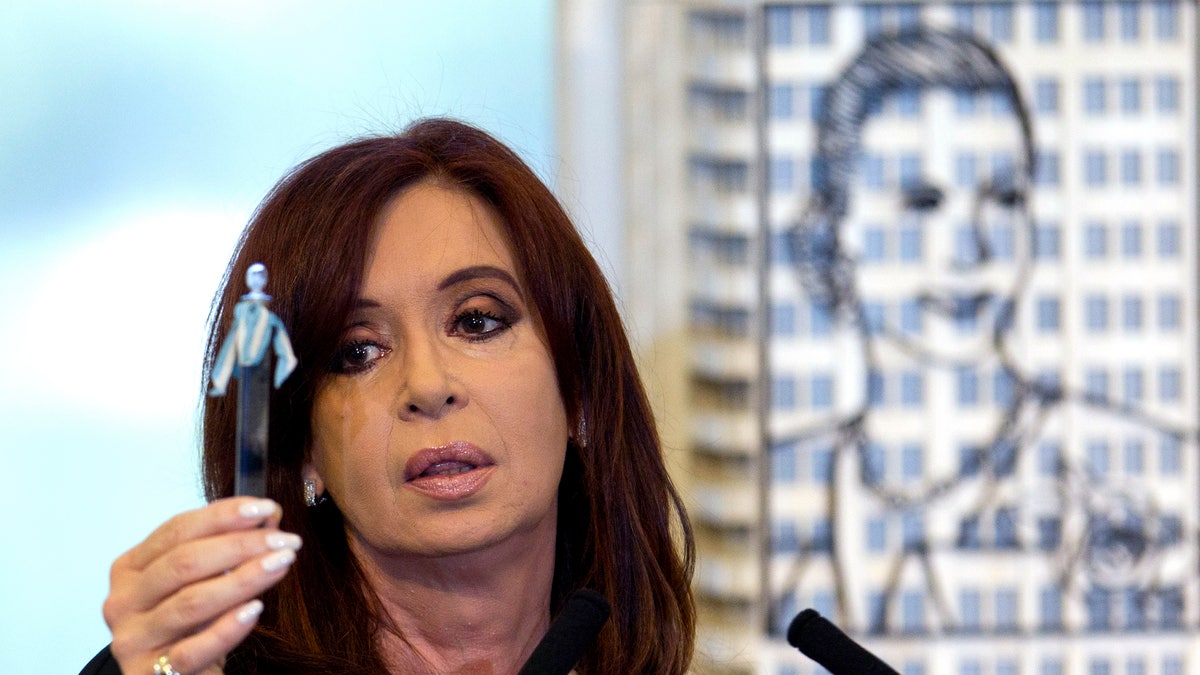
April 16: Argentina's President Cristina Fernandez holds up a tube with a sample of the first oil extracted in the country, during her announcement of a bill to nationalize Spain's controlled oil company YPF, at Government House in Buenos Aires, Argentina. (AP2012)
BUENOS AIRES, Argentina – President Cristina Fernandez on Monday presented a bold plan to seize control of leading oil company YPF by nationalizing the shares owned by Spain's Repsol, moving to expand the state's control over Argentina's energy reserves despite fierce criticism from abroad.
In a national address, Fernandez said that under the bill sent to congress national and provincial governments would take control of the 51 percent of YPF shares owned by the Spanish company.
Argentina is an oil-producing nation that this year expects to import more than $10 billion worth of gas and natural liquid gas in the face of an energy crisis, according to estimates from the hydrocarbon sector. The president complained that Argentina had a deficit of $3 billion last year partly due to energy imports.
"We are the only country in Latin America, and I would say in practically the entire world, that doesn't manage its own natural resources," Fernandez said. She said her proposal "is not a model of statism" but "the recovery of sovereignty."
But analysts said the move risks alienating foreign investors and prompting retaliation from Spain's government.
"It is a bad decision," said Emilio Apud, a former Argentine energy secretary who now works as a consultant. "It gives the Argentine government a bad image" and will discourage investment, he said. Apud also called the proposed law "a bad way to treat friendly governments like Spain."
There was no explanation of how, or how much, Repsol and its stockholders would be compensated. Analysts say that the government might have to use Central Bank reserves, or funds from the National Social Security Administration pension fund to pay for the takeover.
Even with its share prices depressed, YPF last week were valued at $13.6 billion, and buying half of that would deplete Argentina's treasury of funds it needs to maintain the populist subsidies that have kept the country's economy afloat.
Repsol released a statement promising to protect the interests of its shareholders.
"Repsol considers the announced measure to be manifestly unlawful and gravely discriminatory" and contravenes the obligations undertaken by Argentina when YPF was privatized, the statement said.
Spanish officials had earlier protested the plan, saying Argentina risks becoming "an international pariah" if it takes control of Repsol's YPF subsidiary.
Spanish Foreign Minister Jose Manuel Garcia-Margallo last week summoned Argentine Ambassador Carlo Antonio Bettini to convey concern over possible nationalization of YPF, which represents 42 percent of Repsol's total reserves, estimated at 2.1 billion barrels of crude.
In Madrid, Spanish Foreign Minister Jose Manuel Garcia-Margallo called the move arbitrary, and said it broke the climate of cordiality and friendship that had existed with Argentina. He said Spain would respond with "forceful measures" he did not describe.
The European Commission has warned that nationalizing YPF would be bad for the investment climate in Argentina, and has said it backs Spain in the standoff over the subsidiary.
The Buenos Aires stock exchange halted trading on YPF shares at 12:34 p.m. local time on Monday. (1534 GMT)
"This president is not going to answer any threat, is not going to respond to any sharp remark, is not going to echo the disrespectful or insolent things said," Fernandez said earlier in the day to applause from business, union and political leaders at an official event announcing the proposed law. "I am a head of state and not a hoodlum."
YPF is Argentina's biggest company, and Spain is Argentina's largest foreign investor, with the United States in second place.
Joe Amador, Latin America director for Scotia Waterous, the oil and gas arm of Scotiabank, in Houston, Texas, said the big question is where the money will come from, and he said the move is likely to make investors skittish.
"The issue that scares investors is not knowing how far the governmental participation will go, if it's only YPF or if it is going to include other petroleum companies in Argentina," he added.
Governors of oil-producing Argentine provinces have withdrawn about 15 oil leases, representing 18 percent of YPF's crude production, alleging the company failed to keep its promises to develop them. YPF has countered that it has invested millions in those areas and plans to increase production, but Argentine officials have said that still falls short.
How Argentina may try to displace Repsol, which owns slightly more than 57 percent of YPF, has been the subject of wide speculation since the government's pressure campaign began in February. The president's proposal would leave Repsol with just a little more than 6 percent of YPF's shares.
Fernandez put Federal Planning Minister Julio de Vido and Economics Vice Minister Axel Kicillof in charge of handling the expropriation.
The president's proposal declares that the exploration and exploitation of hydrocarbons is "of national public interest" and declares that building up the nation's supply is a priority.
____
Associated Press writers Luis Andres Henao in Buenos Aires and Jorge Sainz in Madrid contributed to this report.
